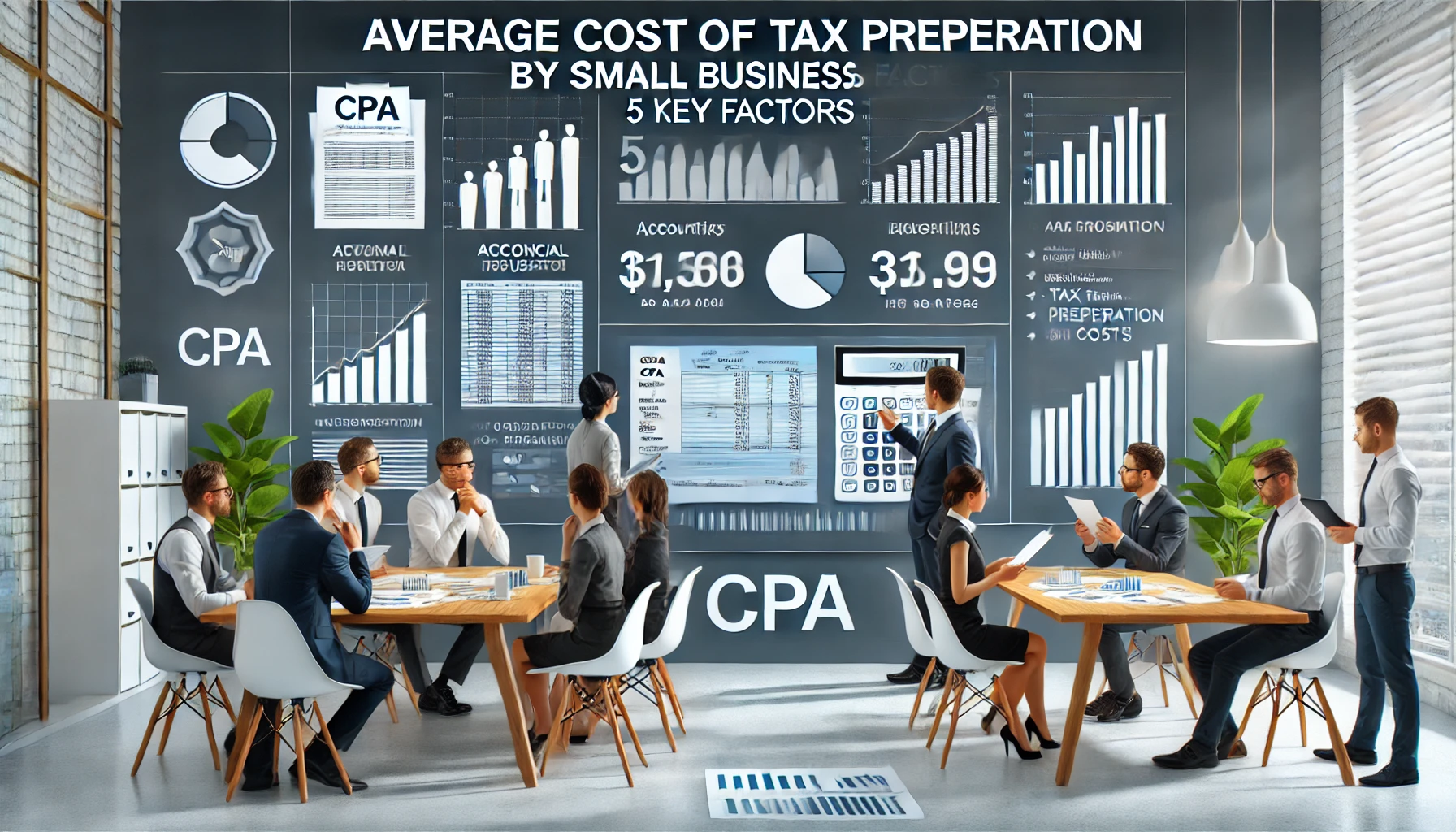Explore the average cost of tax preparation by cpa for small business and learn about the five key factors that influence pricing. Get insights on how to budget for tax services effectively.
Tax preparation is a crucial aspect of running a small business, and hiring a Certified Public Accountant (CPA) to handle your taxes can ensure accuracy, compliance, and peace of mind. However, understanding the average cost of tax preparation by CPA for small businesses can be complex, as various factors influence the pricing. This article will break down the five key factors that determine the cost of hiring a CPA for tax preparation, helping you make an informed decision for your business.
Why Hire a CPA for Tax Preparation?
Before diving into the costs, it’s important to understand why hiring a CPA is beneficial for your small business. CPAs offer expertise that goes beyond basic tax filing. They provide strategic advice, ensure compliance with tax laws, and can help you optimize your tax strategy to minimize liabilities.
Benefits of Hiring a CPA:
- Expertise and Accuracy: CPAs are trained professionals with in-depth knowledge of tax laws and regulations, ensuring that your taxes are prepared accurately.
- Compliance: A CPA helps ensure that your business complies with federal, state, and local tax regulations, reducing the risk of audits and penalties.
- Tax Planning: Beyond preparation, CPAs offer valuable tax planning services, helping you make strategic decisions that can save money over time.
Now, let’s explore the five key factors that affect the average cost of tax preparation by CPA for small businesses.
1. Complexity of Your Business Structure
The complexity of your business structure plays a significant role in determining the cost of tax preparation. For example, a sole proprietorship typically has a simpler tax situation compared to a Limited Liability Company (LLC) or a corporation.
Business Structure Considerations:
- Sole Proprietorships: Generally, the least expensive to prepare taxes for, as they involve filing a Schedule C along with the owner’s personal tax return.
- LLCs: Costs may vary depending on whether your LLC is a single-member or multi-member entity, and whether it elects to be taxed as a partnership or corporation. For instance, filing taxes for an LLC that requires a DSCR loan for LLC might be more involved.
- Corporations: C-Corporations and S-Corporations typically have more complex tax requirements, which can increase preparation costs due to additional forms and schedules.
Average Cost Range:
- Sole Proprietorship: $300 to $500
- LLC: $500 to $1,000
- Corporation: $1,000 to $3,000+
2. Scope of Services Required
The scope of services you need from a CPA will directly influence the cost. Some small businesses may only require basic tax filing, while others might need additional services like bookkeeping, tax planning, or audit support.
Services That Affect Costs:
- Basic Tax Preparation: Involves filing your annual business tax return and may include preparing supporting documents.
- Bookkeeping Services: If your CPA also handles your bookkeeping, this will add to the overall cost but ensures that your financial records are accurate and up-to-date.
- Tax Planning: Strategic planning services, such as advice on reducing tax liabilities or structuring business expenses, can increase the cost but offer long-term savings.
- Audit Support: If you need representation in case of an audit, expect to pay more for these specialized services.
Average Cost Range:
- Basic Tax Preparation: $500 to $1,000
- Bookkeeping + Tax Preparation: $1,000 to $2,500
- Full-Service (Including Planning and Audit Support): $2,500 to $5,000+
3. Geographic Location
Geographic location is another significant factor that influences the cost of tax preparation. The cost of living and doing business in your area can impact what CPAs charge for their services.
Regional Pricing Differences:
- Urban Areas: CPAs in major cities tend to charge more due to higher overhead costs and increased demand for services.
- Suburban/Rural Areas: In less populated areas, CPA services may be more affordable due to lower operating costs and less competition.
Average Cost Range:
- Urban Areas: $1,000 to $3,000+
- Suburban/Rural Areas: $500 to $1,500
4. CPA’s Experience and Reputation
The experience and reputation of the CPA you choose will also affect pricing. Established CPAs with a strong track record and specialized expertise may charge higher fees than less experienced practitioners.
Experience Considerations:
- Newly Licensed CPAs: May offer lower rates as they build their client base, but may lack the deep expertise of more experienced professionals.
- Experienced CPAs: Typically charge more but bring valuable knowledge and insights, particularly for complex tax situations or businesses in specialized industries.
Average Cost Range:
- Newly Licensed CPAs: $500 to $1,000
- Experienced CPAs: $1,000 to $3,000+
5. Filing Complexity and Additional Forms
The complexity of your tax return, including the number of forms required and the specific deductions and credits your business is eligible for, can significantly impact the cost of tax preparation.
Complexity Considerations:
- Number of Forms: More forms and schedules, such as those related to deductions for custom clothing manufacturers for startups or claiming credits for local IT support for small business, will increase the time and effort required to prepare your return.
- Specialized Deductions/Credits: If your business qualifies for specific tax deductions or credits, like those related to box truck financing for startups or fractional CFO for startups, your CPA will need to spend additional time ensuring these are accurately claimed.
Average Cost Range:
- Simple Returns (Few Forms): $300 to $700
- Complex Returns (Multiple Forms and Credits): $1,000 to $3,000+
Comparison of Average Tax Preparation Costs by CPA
| Factor | Impact on Cost | Average Cost Range |
|---|---|---|
| Business Structure | Higher complexity increases cost | $300 to $3,000+ |
| Scope of Services | More services increase overall cost | $500 to $5,000+ |
| Geographic Location | Urban areas tend to be more expensive | $500 to $3,000+ |
| CPA’s Experience and Reputation | Experienced CPAs charge higher fees | $500 to $3,000+ |
| Filing Complexity and Additional Forms | More forms and credits increase cost | $300 to $3,000+ |
How to Reduce the Cost of Tax Preparation
While hiring a CPA is often necessary for ensuring accurate and compliant tax filing, there are several strategies you can use to keep costs manageable.
1. Maintain Accurate Records
Keeping detailed and organized financial records throughout the year can reduce the time your CPA needs to spend on your tax return, thereby lowering costs.
2. Use Accounting Software
Implementing accounting software can streamline the bookkeeping process and provide your CPA with accurate data, reducing the time and cost involved in tax preparation.
3. Limit Scope of Services
If you’re on a tight budget, focus on essential services like basic tax preparation, and handle tasks like bookkeeping in-house or through less expensive services.
4. Plan Ahead
Engage with your CPA early in the tax season to avoid last-minute rush fees. Planning ahead can also give you time to explore tax-saving strategies.
5. Compare CPA Services
Don’t settle on the first CPA you find. Compare quotes from several CPAs and consider their experience, services, and client reviews before making a decision.
FAQs
What is the average cost of tax preparation by a CPA for small businesses?
The average cost of tax preparation by a CPA for small businesses typically ranges from $500 to $3,000, depending on factors such as the complexity of your business structure, the scope of services required, and the CPA’s experience.
Can I reduce the cost of tax preparation?
Yes, you can reduce the cost of tax preparation by maintaining accurate financial records, using accounting software, limiting the scope of services, planning ahead, and comparing different CPA services to find the best fit for your budget.
Is it worth hiring a CPA for my small business taxes?
Hiring a CPA is often worth the investment, especially for businesses with complex tax situations. A CPA can ensure compliance, provide strategic tax advice, and potentially save your business money by identifying deductions and credits you may have missed.
What factors affect the cost of CPA tax preparation?
The cost of CPA tax preparation is influenced by factors such as your business structure, the scope of services required, geographic location, the CPA’s experience, and the complexity of your tax return.
How do I choose the right CPA for my business?
Choose a CPA based on their experience, reputation, and familiarity with your industry. It’s also important to compare pricing and ensure they offer the services you need.
What additional services can a CPA provide?
In addition to tax preparation, a CPA can provide bookkeeping, tax planning, audit support, and financial consulting services, all of which can contribute to the overall cost but offer significant value for your business.
Conclusion
Understanding the average cost of tax preparation by a CPA for small businesses is crucial for budgeting and ensuring your business is compliant with tax regulations. By considering the five key factors outlined in this article—complexity of your business structure, scope of services, geographic location, CPA’s experience, and filing complexity—you can better anticipate the costs and make informed decisions. Whether you’re looking to save on expenses or invest in comprehensive CPA services, these insights will help you navigate the tax preparation process with confidence.
For further insights into maximizing your business efficiency, consider reading our article
- Fractional CFO for Startups: Key Benefits in 2024
- Personal Injury Lawyer Marketing: Get More Clients
- Maximize Efficiency with Best Marketing Automation
- Dental Practice Marketing Tips to Attract More Patients
- Best HR Software for Startups: Must-Have in 2024
- Best Clothing Manufacturers for Startups: Top 5 for 2024
Our Blog on Insurance & our Best Articles:
- Does ClicRx Use Insurance? 3 Interesting Facts You Need to Know!
- Would an insurance adjuster trick you with a bank statement? 5 Red Flags to Watch!
- Does clicrx eye glasses use vision benefits insurance? 4 Things You Should Know!
- What Does Comprehensive Vehicle Insurance Cover by Moneytadka.com? 3 Essential Insights!
- How much does bar insurance cost in sequin Texas 2024? 3 Best Pricing Tips!
- AAL Insurance: Top 7 Benefits You Can’t Ignore!
- CIG Auto Insurance: 4 Reasons It’s the Best Choice in 2025!
Our Blog on Trading & our Best Articles:
- Blackbox Trading Explained: How It Works and Is It Right for You?
- Electronic Trading: How Technology is Transforming Financial Markets
- Mastering ICT Trading: Understanding Institutional Concepts and Strategies
- The Rise of AI Trading Software: Can Artificial Intelligence Beat the Market?
- Top 10 Best Futures Trading Platforms for 2025: A Complete Guide


